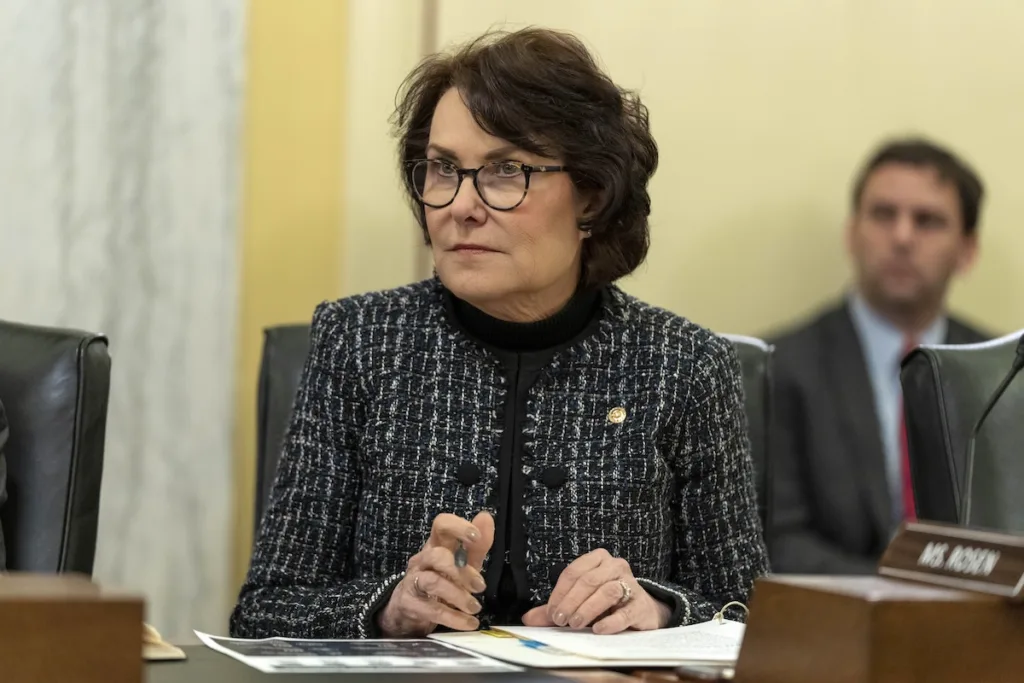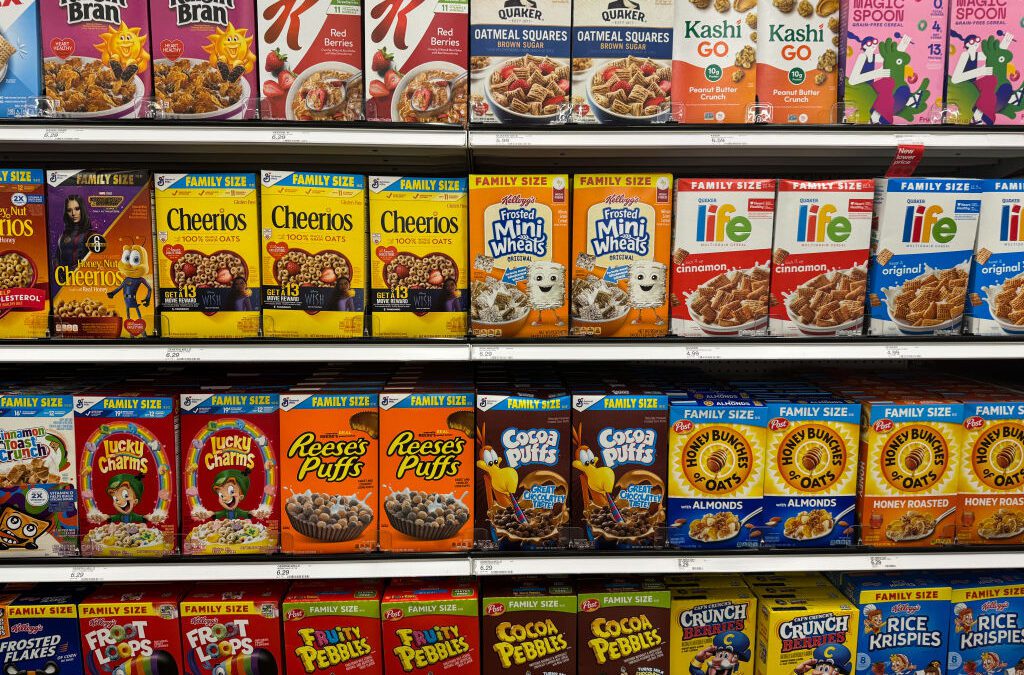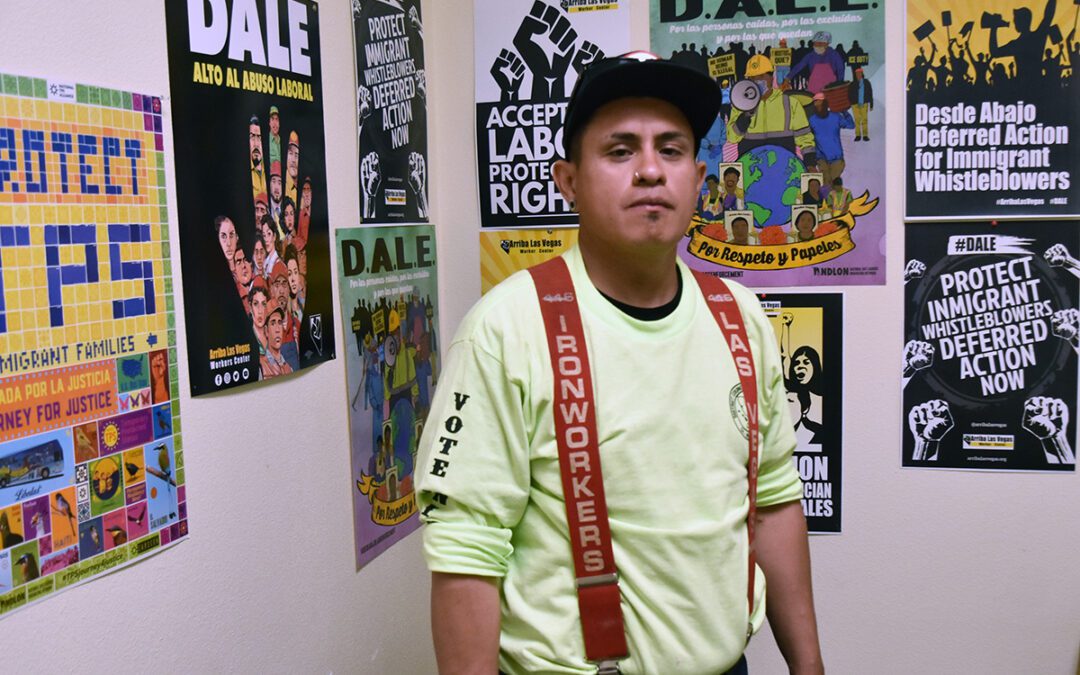
FILE - Sen. Jacky Rosen, D-Nev., listens during a hearing of the Senate Armed Services Subcommittee on Strategic Forces to examine United States Space Force programs in review of the Fiscal Year 2024 Defense Authorization Request, March 14, 2023, in Washington. Rosen announced Monday, March 4, 2024, at a union hall in Las Vegas that she has officially filed for reelection in a presidential battleground state that is a top GOP target in a challenging 2024 Senate map. (AP Photo/Alex Brandon, File)
“My constituents lack assurances that the proposed deal will not further increase food costs for hardworking Nevadans who are already getting squeezed by rising grocery prices,” Sen. Rosen wrote in a December letter to the FTC.
If you’ve left the grocery store with a heftier-than-usual bill over the past few years, you’re not alone—and one Nevada senator has taken steps to try and prevent further price increases.
Senator Jacky Rosen (D-NV) fears that a proposed “mega-merger” between grocery companies Kroger and Albertsons could further inflate grocery prices and monopolize the supermarket scene, financially burdening families in Nevada and beyond.
In response to the proposed $24.6 billion supermarket merger—the largest in US history—Rosen urged the Federal Trade Commission (FTC) to block the merger in a December letter to FTC Chair Lina Khan.
The FTC announced last week it had filed a lawsuit against Kroger and Albertsons challenging the merger. The Office of Nevada Attorney General Aaron Ford is also joining the lawsuit, alongside the attorneys general of seven other states and Washington D.C.
Rosen’s letter to the FTC emphasized the consequences of a merger on ordinary Nevadans.
“Were the acquisition to be approved, the five largest food retailers in the country would control more than half of all grocery sales,” Rosen wrote. “Nevadans are therefore understandably concerned that this merger could mean less competition and higher food costs, with the deal giving the newly-merged company the power to unilaterally raise prices in Nevada supermarkets.”
Mergers and monopolies hurt consumers by narrowing choices and forcing shoppers to accept inflated prices, according to the non-profit Open Markets Institute. Mergers and acquisitions like the proposed Kroger-Albertsons deal also allow top industry producers to exert control over a limited pool of remaining competitors.
“Consumers, from whom this entire system is hidden, find their choices manipulated and limited by the arrangement, as growing market concentration reduces competition for the consumer’s dollar,” the Institute says. “Monopolies often present themselves as champions of consumer choice, but that is rarely true.”
“We all know that when you reduce competition, what happens? The prices go up,” Rosen told KNTV Las Vegas last week. “So when you only have one grocery store, they’re the only game in town. They can charge whatever they want.”
In Nevada, the merger would impact several popular grocery store chains in addition to Albertsons and Kroger themselves. Albertsons has 35 locations in Nevada, and also owns Vons and Safeway, which have 8 and 7 locations in the state respectively. Kroger, meanwhile, counts Smith’s among its subsidiaries. The latter operates 46 stores across Nevada.
“With Nevada families facing rising costs across the board, this would be a particularly challenging time for the Kroger-Albertsons merger to be approved,” Rosen wrote. “My constituents lack assurances that the proposed deal will not further increase food costs for hardworking Nevadans who are already getting squeezed by rising grocery prices.”
Grocery prices have risen by more than 20% since the beginning of the pandemic. In Nevada, grocery prices rose 4.2% from Nov. 2022 to Nov. 2023, according to an analysis conducted by Consumer Affairs.
Rosen also stressed the merger’s impact on rural Nevadans. Communities like Elko, Mesquite, and West Wendover have “few grocery options and limited competition,” she said.
“Am I gonna take big corporations at their word when they say they want to merge and they’re going to make it better for the consumer, when they’re going to give you less choice and less competition?” she said in her statement to KNTV. “I say it doesn’t take an expert to think maybe we shouldn’t take them at their word. That’s why the FTC is suing to block this merger.”
Rosen, who officially announced this week that she will seek reelection, is no stranger to tackling price gouging. Last month, she helped introduce the Shrinkflation Prevention Act, a bill that would make it easier to penalize large corporations for shrinking product sizes without proportionally lowering prices.
In addition to increased grocery prices, opponents fear that the Kroger-Albertsons deal would allow the merged corporation to exert more control over store employees and their unions.

Nevada Senators Rosen, Cortez Masto support effort to exempt tips from taxes
Nevada has the highest concentration of tipped workers in the nation, and those tips are currently subject to federal taxes. A new bipartisan bill...

Apprenticeship programs are helping Nevadans launch their careers
The number of registered apprentices in Nevada has more than doubled over the past decade and a recent surge of funding from the Biden...

While corporations make billions, inflation continues to hurt Nevadans
Grocery and food companies’ massive profits have drawn increased scrutiny from lawmakers, including Nevada Sens. Jacky Rosen and Catherine Cortez...

El Día Internacional de los Trabajadores fue dedicado a los varilleros
Este año, Arriba Las Vegas Worker Center conmemoró el Día Internacional del Trabajador con una caravana de acciones en las que destacaron...

Biden makes 4 million more workers eligible for overtime pay
The Biden administration announced a new rule Tuesday to expand overtime pay for around 4 million lower-paid salaried employees nationwide. The...

Biden administration bans noncompete clauses for workers
The Federal Trade Commission (FTC) voted on Tuesday to ban noncompete agreements—those pesky clauses that employers often force their workers to...




